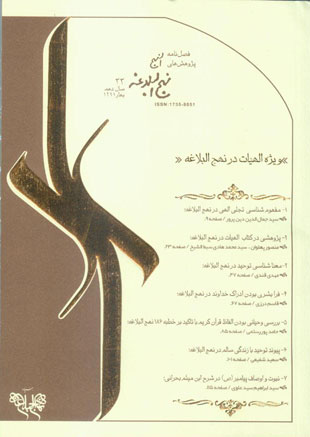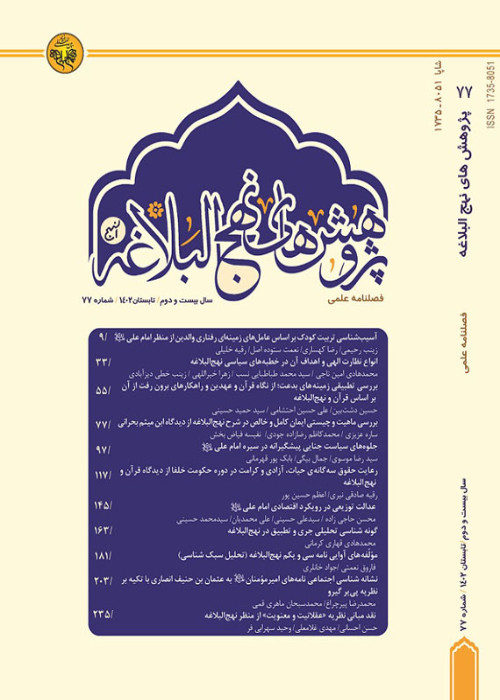فهرست مطالب

نشریه پژوهش های نهج البلاغه
سال یازدهم شماره 1 (پیاپی 33، بهار 1391)
- 136 صفحه، بهای روی جلد: 40,000ريال
- تاریخ انتشار: 1391/02/12
- تعداد عناوین: 8
-
-
صفحه 5
-
صفحه 47
-
Page 9Intimacy is not confined only in vision. The real intimacy is gained by wisdom and mind. The intimacy of god is also the result of wisdom and mind not through vision because this sense belongs to things and objects while god is not an object. The monotheistic discussions of Nahj Albalagha open a new horizon to the people. The achievement of god knowledge and insight happens through the incarnation of god in man’s mind which opens a new path of knowledge in man’s life which is not related to any material or to any philosophical or argumentative discussions. Although in this type of intimacy the mind and logical reasons are also in charged to ensure the existence of god but they have nothing to do with the nature of god. In fact god’s nature is far beyond any elusive. In fact the creation is the intimacy of god in human which the man can understand it with no medium. Intimacy is a type of spiritual and logical presence which leads the human to knowledge and wisdom in the way that the man can conceive the manifestation of god.Keywords: Celestial wisdom, birth place of wisdom, demonstration of causation, incarnation of god, revelation
-
Page 23One of the books which has inspected the subject of divinity in Nahj Albalagha is (The Divinity in Nahj Albalagha) authorized by Ayat Allah Safi Golpayegani. This book is composed by Bonyad Nahj Albalagha in 1361 in eighteen chapters. In this book divinity is discussed by its general meaning in Nahj Albalagha and some of them are as following: theism, development of nature and negation of composition, unification, the concept of adoration and worship, god justice, formative traditions and religious goals. There is a short biography from the author and introduction of some of his writings in this article. The values of the divinity in Nahj Albalagha book are said in ten titles. Some of these values are Imam Ali (p.b.u.h) and unification, factual divinity, the unity of Islamic nation, awareness of philosophical and verbal basis and logical reasoning in unification.Keywords: Divinity, Nahj Albalagha, Imam Ali (peace be upon him), theism, unification, adoration, worship
-
Page 47Unification means to recognize god as The One. The word, one has dif ferent meanings in Arabic. There are different meanings of The One in Imam Ali’s words and some of the monotheistic words are not preferred for the glory of god. Imam Ali has purged god from numeral and typical unity. He has mentioned a condition of unification which is a level after god wisdom. In this level, unification is the position of admiration. Before it approves the unity of the creator, it proves the unification of him before the creation, his unity during the creation, and his purity from choosing any company or child after the creation. From the other side it denies any similarities between him and other creatures and it also denies any combination in his nature. Imam Ali’s explanations in Nahj Albalagha are full filled with these meaning.Keywords: Unification, Asma Alsefat, negation of similarities, Nahj Albalagha
-
Page 67In this article we will discuss about Imam Ali’s words specifically and with the help of it we will explain that Imam Ali stated that ambient understanding of god in all the levels is far beyond the sense and logic. He has also emphasized on a type of recognition of god which ends up to the allegory and comparison of god with no other phenomenon. Later on it explains the type of recognition which is meant by Imam Ali and the allowed type of understanding which is granted by the holly nature of god to the man and it has occurred from the thoughts in his creation.Keywords: Human senses, understanding of god, Nahj Albalagha, Ali (p.b.u.h), ambient understanding
-
Page 85Holly Quran is the unique prism of god which carries out perfection and fortune through Etrat. Although there are some ideas about some of the characteristics of this book which have to be evaluated through the favorable or unfavorable system of them with the thoughts of the Prophet Mohammad’s family. Inspiration or non inspiration of the words of Quran is one these subjects which has occupied the minds of the scientists. But analyzing the process of comparison of inspiration in discourse 186 in Nahj Albalagha says that the god had put aspects of inspiration in Prophet Mohammad and Gabriel and Prophet Mohammad had no role in the process production of the verses contents. The only role of him was transferring the messages and inspirations of god and this is the main difference of Quran inspiration with legends and traditions.Keywords: Inspiration, words of inspiration, meanings of inspiration, Quran, Nahj Albalagha, comparison of inspiration
-
Page 101Tawhid (Monotheism), the best important of Islam’s five pillars, is one of the important characteristics of safe living in Nahg al-Balagheh. Imam Ali (peace be upon him) in speech’s 147 of Nahg al-Balagheh said that the Messenger of God came to release servants of God from idols servitude to God worshiping. One of the Imam Ali’s theism characteristics, is God’s known in events of days. He said: I knew Glorious God by the weakness of wills and the opening of Nodes. The monotheistic observation in the world, is beautiful look and full of hope and inner joy. To believe in and friendship with God that everything in his hands, will bring all world’s treasure to man and reward Hereafter to him, it will remove him from all of fears and concerns and replace it with Enjoy and beautiful look. From the monotheistic view, a believer is winsome in the world and honorably in Hereafter. In such a view, the daily bread Itself is looking for human and ravening on it, nothing but suffering and in sume cases, adds sin. The monotheistic look on the world in Nahg al-Balagheh, have the fruits and effects in the life, Some of which include: Not depend on the world, Inner peace, Relying on God’s Interminable capital, Thirst for knowledge, Humility, Respect the rights of the people and Abundance of divine blessings.Keywords: Tawhid (Monotheism), safe living, Nahg al Balagheh, Imam Ali


